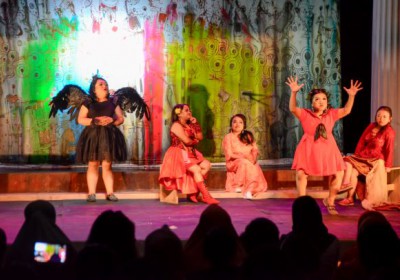IDF 2019 Arts / Cultural Performances Winner: Nanik Indarti Against Mini Body Discrimination Through Art
October 12, 2019
Nanik Indarti, and Unique Project performance.
Winner of the Art or Culture Performance of the Indonesian Development Forum (IDF) 2019, Nanik Indarti used art to fight discrimination against little people or people with achondroplasia. Nanik received an award from the Minister of National Development Planning / Head of Bappenas, Bambang Brodjonegoro at the IDF 2019 Closing ceremony on July 23.
"Empowerment through art is a flexible way to convey criticism to the public that physical limitations are not something that must always be discriminated against, bullied, and exploited," said Nanik, a person with achondroplasia who works as an artist.
Nanik Indarti, Founder of Unique Project, an art community in Yogyakarta involving mini people. Nanik was born in Bantul and graduated from ISI Yogyakarta Theater Arts. She is active in performing arts productions in several art communities in Yogyakarta. Nanik studied and worked at Padepokan Seni Bagong Kussudiardja.
In 2017, she chose to work independently as an art worker and refused exploitation against little art workers in the entertainment industry. In 2018, Nanik became one of the winners of women's art grants organized by Cipta Media Ekspres, Wikimedia Indonesia.
Nanik said that art, including the entertainment industry, became the place where most people chose to work with little people.
"This is due to the lack of jobs available for them. That’s why entertainment industry becomes the final destination for those who do not have access to other professions,“ she added.
Even so, she said, even in the entertainment industry they often get unfavorable treatment.
“There are many cases where my fellow little friends are not paid, or inadequately paid, and mostly only exploited," continued Nanik.
Nanik chose theater as a channel for work. For Nanik, theater performances are an appropriate way of expressing power to talk about problems experienced by achondroplasia. These problems include discrimination experienced by miniature people in the world of work, access to education, and public facilities.
Stories of Discrimination Against the Little People
According to Nanik, many achondroplasia sufferers who have difficulty accessing education. With low education, available employment is very limited.
“Because most schools will not accept them. Then how can they maximize their potential? Most of my fellow little people are those with low education,“ she continued.
Nanik said, even if a little person managed to go to school, they are often bullied. This pressure makes them embarrassed and feel inferior. Their confidence evaporates into thin air. She then told a story of one of her friends in Solo, Central Java.
"When she entered elementary school, many parents did not like her presence. They went to the principal. My friend was asked to leave and the principle suggested her moving to a school for students for special needs (SLB), “she said.
While in the world of work, mini-bodied people are not only difficult to access employment, they are also considered incapable. There was also a story of a mini-bodied lecturer, who was the first to teach at a university in Kalimantan. But, he got verbal abuse by another lecturer because he was considered unable to teach.
"In the world of education, which we believe to be academic, people still consider others from the physical condition and not from the potentials and capacity," she added.
Nanik also highlighted the difficulty of them accessing public facilities. For example, counters in public service agencies are built high.
She hopes that in the future educational institutions will provide the widest possible access and equal opportunities for persons with a mini body through inclusive education.
"For example, getting support in the teaching and learning system, can get scholarships, student exchange forums, and others," continued Nanik.
Likewise in the world of work, the government and employers can provide training in every area that can be reached. With the same opportunity, the little people can show their real potentials.
"Little people in Indonesia have the same ability. Many of us became lecturers, dancers, choreographers and others,” she explained.
Nanik and the Messages in Her Works
“I am a unique woman" is her first written work that tells the life of seven little women in Indonesia. In the book, Nanik wrote about the life of little people, when they were bullied, exploited, discriminated against until they found their true self, became strong, embracing, and accept their physical condition.
“To be of our little size is not easy. Our long process is a valuable life experience. We are the same, but people don't think we are the same,” she continued.
Her other work is an art performance entitled "The Same Shoes Story of the Soul and Numbers". Through this work, Nanik offered criticism of the community's stigma to the little community.
"They label us as useless people. This criticism is aimed at the wider community to better appreciate the little people and to look at someone beyond their appearance and size. We should look at them in terms of what they are capable of doing. We are the same, despite the different size," said Nanik again.
The performance entitled "The Same Shoes Story of the Soul and Numbers" was featured in the Ideas and Innovations Marketplace - Connecting for Scaling Up Session. Nanik's struggle against discrimination through art, calling for inclusive education, and encouraging equal treatment in the world of work for minis, is in line with the values and principles of organizing IDF 2019 which has the main theme "Mission Possible: Seizing the Opportunities of Future Work to Drive Inclusive Growth".
Congratulations to Nanik for winning the Cultural Arts Performance Competition at IDF 2019!
Indonesia’s Research Institutions Supporting the Development of the Electric Vehicle Industry
Indonesian Muslim Fashion and Cosmetics IKMs Shine at Dubai World Expo 2020
Govt Steps Up UMKM Transformation Efforts in the Midst of Pandemic Slowdown
Govt Encourages Promotion of IKM Products in Digital Era
Government Begins Developing Maritime Training Center in Makassar
Tweets by IDDevForum
